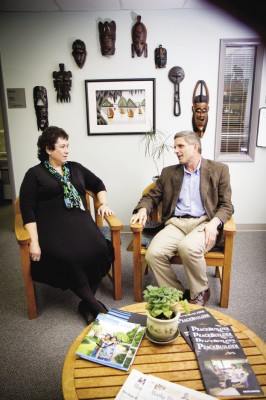
CJP has moved into a new leadership era. J. Daryl Byler, JD, is its executive director, reporting to Provost Fred Kniss. Jayne Docherty, PhD, is CJP’s program director, reporting to Byler.
Both Byler and Docherty are veteran peace practitioners, focused on conflict transformation and development efforts both domestically and abroad. Byler comes with extensive experience in leading nonprofits and Mennonite church initiatives, including fundraising. Docherty has extensive academic institutional experience, with teaching stints at three universities.
Byler has directed programs for Mennonite Central Committee (MCC) in Washington D.C. and the Middle East. He came to EMU in July 2013 from Jordan where he had lived with his wife Cindy since 2007, both of them coordinating peacebuilding projects run by MCC’s local partners in Iran, Iraq, Jordan, Israel and Palestine.
Byler recalls being impressed by the work of dozens of CJP alumni in the Middle East, noting how CJP “transformed the way they think about conflict and the way they have integrated the principles and experiences learned at EMU in the challenging Middle Eastern context.”
As director of MCC’s Washington Office from 1994 to 2007, Byler met regularly with policymakers on Capitol Hill, the State Department and White House. Prior to that, he spent six years as a staff attorney in Meridian, Miss., while serving as senior pastor for Jubilee Mennonite Church, an interracial congregation. He came to EMU with significant fundraising experience, including leading a capital campaign for Virginia Mennonite Retirement Community.
Byler holds a Juris Doctor from the University of Virginia, where he also did graduate business coursework. He earned two degrees from EMU, an MA from the seminary in 1985 and a BA in business administration in 1979.
On the CJP faculty since 2001, Docherty spent much of 2008-12 working with groups in Burma/Myanmar on supporting the transition from a military dictatorship to a more democratic form of governance. Prior to this, she helped the Institute for Peace and Justice Education at Lebanon’s American University to develop a summer peacebuilding training program for young leaders in that country. She has led workshops on peacebuilding topics in a dozen other countries.
Docherty is continuing to teach quarter-time as professor of leadership and public policy at EMU. She has also taught at George Mason University and Columbia College in South Carolina. She earned her PhD at the Institute for Conflict Analysis and Resolution at George Mason and holds an undergraduate degree in religious studies and political science from Brown University. She studied theology at the University of St. Andrews in Scotland.
Docherty is in the leadership of the Peace Appeal Foundation, an organization that “supports peace and conflict resolution processes globally through inclusive, multi-track and multi-sector interventions designed to achieve agreed, fair and just outcomes.” She is an active member of the Association for Conflict Resolution, the International Peace Research Association, and the International Studies Association.
Byler replaced Lynn Roth, who became the North American representative to Mennonite World Conference. In the new CJP leadership configuration, both the executive director and program director are three-quarter-time positions.
“Daryl will be giving administrative leadership to CJP with a primary focus on building external relationships, networking with key university and external stakeholders, and developing resources for CJP’s growth and success,” said Provost Fred Kniss upon announcing Byler’s appointment.
Concerning Docherty’s role as program director, she will “oversee the development, integration, funding, delivery and evaluation of CJP’s various programs,” said Kniss. “This includes the coordination of the academic and practice programs of CJP, and giving leadership to curriculum development.”